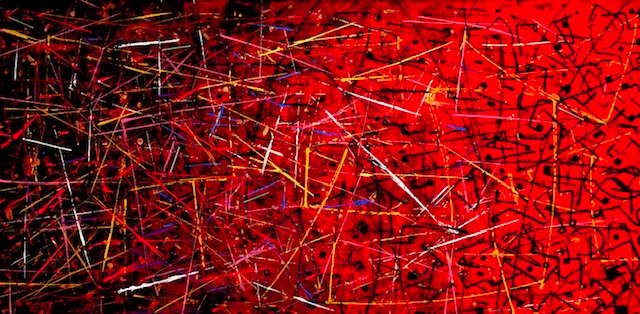 UPDATES: There's a new feature every day at Classical Music Daily. Read about the various ways we can keep in touch with you about what's happening here.
UPDATES: There's a new feature every day at Classical Music Daily. Read about the various ways we can keep in touch with you about what's happening here.
 DISCUSSION: John Dante Prevedini leads a discussion about Composers, individuals or collective?, including contributions from David Arditti, Halida Dinova, Robert McCarney and Jane Stanley.
DISCUSSION: John Dante Prevedini leads a discussion about Composers, individuals or collective?, including contributions from David Arditti, Halida Dinova, Robert McCarney and Jane Stanley.
- Lera Auerbach
- Keda Records
- Tom Krause
- Third Reich
- Henk Badings
- Carlos Antonio de Padua Chávez y Ramírez
- Szymanowski: Violin Concerto No 2
- Mahler Chamber Orchestra
Music Speaks for Itself

An interview with the composer Paul Carr,
by ANETT FODOR
Contemporary music is frequently and falsely thought to be outlandish, avant-garde, experimental and difficult. Professionals in the music world often feel that there is a widening gap between artists and this blanket misconception.
I asked a very approachable twenty-first-century composer, whose expressive language, orchestration, lyrical tone and creative message do not estrange, to introduce his work to us.
Paul Carr (born in 1961, England) has been writing music since adolescence. For many years his main career was in opera stage management working with some of the world's leading companies.
He has written scores for several British films and his concert work is varied. Performances in recent years include his Violin Concerto (premiered at The English Music Festival), Summer Music for Piano Trio, a setting of Ubi Caritas for Choir with Cor Anglais and Strings, Concerto for Two Saxophones, Wind Quintet and a concert overture Chasing Aunt Sally — plus much chamber and choral music.
His latest works include A Very English Music for String Orchestra, an Oboe Concerto (for the world-renowned oboist Nicholas Daniel), a Bassoon Concerto, a Piano Quartet, a Sinfonietta for Orchestra, and three versions of the same work: Air for Strings, Air for Orchestra and Viola Air. His Requiem For An Angel for two soloists, choir and orchestra, has also been very favourably received.
At the present time he is working on several large-scale pieces.
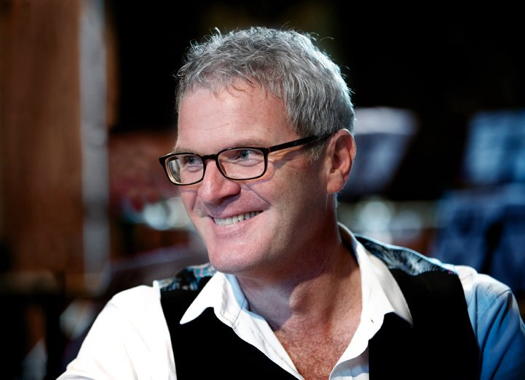
Paul Carr
Anett Fodor: You started composing when you were fifteen. When did you find your own style? Was it a difficult process? Do you remember your first composition?
Paul Carr: I started composing on a wet Sunday evening at my family home in Forest Row, Sussex. I was bored with practising scales etc and as the rain drizzled down the window, I started fooling around at the piano. This turned into a short piece expressing the image of gentle rain on a dank Sunday evening in Sussex. In fact, I called it A Rainy Night. It was a soulful, atmospheric piece, but I never wrote it down. I played it to my piano teacher, Phillip Lange, the next day and he said I should play it at the school concert, so I did. In fact, I played it twice, because the audience kept applauding until I did so. That was the start ...
Over the subsequent years I continued to write as much music as possible, always influenced by the composers I loved and was discovering: Stravinsky, Malcolm Arnold, Richard Strauss, Benjamin Britten, Lennox Berkeley, Tippett, Copland, Barber, Menotti, Bernstein, Hindemith, Mahler etc. I was also much influenced by Howard Blake (whom I knew in my late teens) — especially his gorgeous Piano Quartet. My music has always been predominantly led by theme and harmony, and I've stayed true to that. I did so even during the 1970s when almost no one was writing tuneful, expressive music, so I always felt a little isolated. My attempts at atonality were a disaster! However, times change and since then I've come into my own in recent years as a choral composer and I find that my own style (which is a definite lyrical one) has blossomed.
AF: Who was the greatest influence upon your musical style?
PC: There have been so many musical influences in my life that it's impossible to single one out. Interestingly, I have a special fondness for Britten and Richard Strauss, probably due to the fact that when my mother — Australian soprano Una Hale — was four months pregnant with me, she was singing both Ellen Orford in Peter Grimes and The Marschallin in Der Rosenkavalier at The Royal Opera House, Covent Garden.
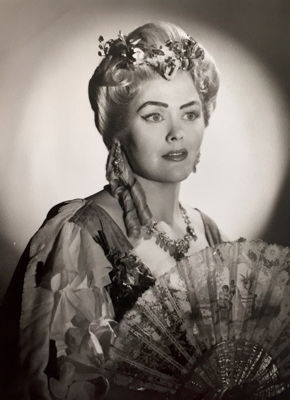
Australian lyric soprano Una Hale (1922-2005) as The Marschallin in Der Rosenkavalier, 1961 at the Royal Opera
I'd say I've mostly been influenced by twentieth century British and American composers. Now in my late 50s, it's to the baroque composers such as Handel, Bach and in particular, Vivaldi, to whom I now feel particularly drawn; it's as though I've done things in reverse. Well, I've never really done what is the norm, or what was expected of me in my life and I like that!
AF: What inspires you?
PC: Inspiration: the need to create, to express, to give pleasure and to reward emotionally.
I've written a lot of religious choral music, not because I have a devout belief, but because I am drawn to Jesus Christ as an exceptional man, wrongly persecuted for being different, for speaking out, for wanting to do good in the world. I feel I have a spirituality, which is drawn from the human world rather than a religious one.
AF: Which composer(s) would you talk to if you could travel back in time? What would you ask?
PC: I remember going to hear Tippett talk at the Royal Albert Hall before the premiere of his oratorio The Mask of Time during The Proms. He was fascinating, but I had absolutely no idea what he was talking about. I've never really felt I wanted to talk to any composers. I briefly met Walton and Bernstein, but was so awestruck I could barely speak! I've been asked to talk about my music publicly on many occasions, but I hate doing so. Music speaks for itself, or at least, it should do. Actually, I'd love to talk to Arvo Pärt — I adore his music and I think I'd find him both fascinating and uplifting.
AF: To what extent can composing be learned? Does it require a special, inborn ability?
PC: I never studied composition, but studied musical theory while at school with Cecil Cope, who was a composer himself. I did so again when I was a singing student at The Guildhall School of Music & Drama in the early 1980s. I am largely self-taught, but a passionate love of music and the desire to create have been my greatest teachers. Writing music is like painting or cooking — you need to understand and learn the basics in order to make the most of them and that is all that can be taught; then it's up to you ...
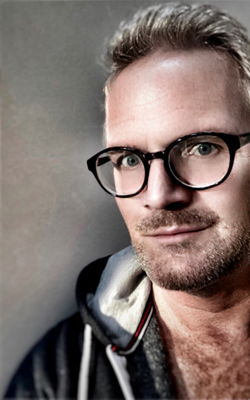
Paul Carr
AF: Do you have a special working method? How do you work?
PC: For me, once I've started a piece, it's like driving for hours, days or weeks on a deserted road without stopping, but starting is often the hardest part of any composition. I don't have a special compositional method — I just start and off I go. Often I'll write in the morning up to lunchtime or into the afternoon, then I'll either leave it until the next day, or return to it as and when the mood takes me. I tend to write quite quickly, but will let the piece sit for a few days once finished and then I'll return to it and alter things. Knowing when to stop is also a problem. I'm now published by Goodmusic Publishing; they let me change things if I feel I need to, even after they're published.
I mostly write directly onto my computer using Sibelius and just a mouse. I have a piano I refer to at times, which is especially useful for creating the 'piano reductions' of choral works, writing songs and chamber music. As a general rule though I just click on a score with my mouse. It's like painting or cooking; you have the paint or the ingredients and it's up to you how you put them together. I also use wireless headphones on the computer as it's important to listen without following the notes. We listen differently when we can't see the music. Sometimes, I could swear that Sibelius is suggesting things to me? ...
AF: What are you working on now?
PC: I'm presently working on an arrangement of my Summer Music for the brilliant young saxophonist, Robert Burton. I wrote it last summer as a trio, but actually, I think it will work best in this new version for alto saxophone and piano. I've just finished a setting of O Magnum Mysterium as a thank you gift to the four choirs who have performed my Requiem for an Angel and Stabat Mater this year. It's scored for choir with oboe, harp and strings. I'm looking to write another large-scale choral work, possibly on the Stations of the Cross, and I'm thinking about composing a choral version of Vivaldi's Four Seasons. I'm also going to re-write my Piano Concerto for the Left Hand for two hands, because it's never been done. Even though Bath Philharmonia commissioned it, payment never materialised and they did not programme it. I think the piece is deserving, so I'm going to re-work it.
AF: When and why did you start painting? Do you usually paint abstract pictures?
PC: I was always good at Art at school and I have a love of contemporary artists, especially the likes of Jackson Pollock, Joan Mitchell, Barbara Hepworth, Wilhelmina Barns-Graham and John Wells. I lived on the beautiful island of Mallorca from 2003-2010 — an island full of artists and art galleries. We had acres of land and I could throw and smear paint on large canvases outdoors with ease — all very abstract, very Jackson Pollock, with bold, vibrant colour. I had several sellout exhibitions on the island, where painting went hand in hand with composition and mixing cocktails ...
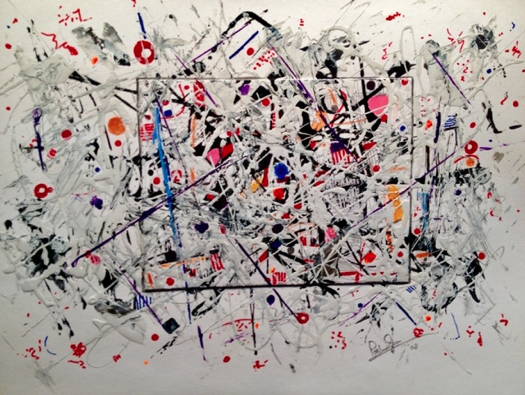
A Paul Carr painting, created especially for the published score of his composition Holding the Stars for unaccompanied mixed voice choir
Since returning to live in Bath, I now have an apartment and nowhere to throw paint, so art work is small-scale and rarely happens, regrettably. I continue to design most of the covers for my published music though.
AF: Do you have any other hobbies?
Paul Carr: I enjoy cycling and I've taken to jogging along the river in Bath. I do enjoy being a waiter — I ran a small restaurant in Mallorca — and I work in a posh-pub outside Bath sometimes. I also help out in my local bar simply because I enjoy it. I guess these are hobbies? it's important for me to get out and socialise. I need solitude for my composing, but really never for long. I love my local bar and the fabulous collection of regulars I've come to know and love.
AF: What does success mean for you?
PC: Well, I guess success is important only in as much as it leads to more performances of my music and to new commissions. For me, the greatest success lies in inspiring performers and those who listen; in generating a positive emotional response. I was delighted when Classic FM launched the recording of my Requiem for an Angel — it gave a massive boost to my career as a composer. They regularly play my Air for Strings and that makes me very happy.
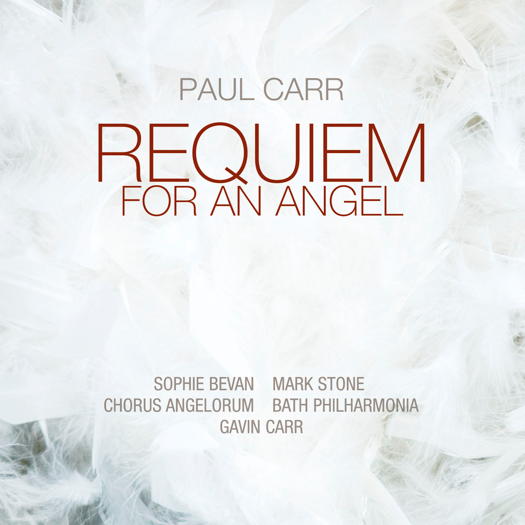
Paul Carr: Requiem for an Angel. © Stone Records. Catalogue number 5060192780048
I also have a career as an Opera Director and have various productions lined up for the coming years, including La bohème for Oxford Opera and Hänsel & Gretel for The Reisopera in The Netherlands. I will also be directing Peter Grimes, although dates have not yet been confirmed. I've worked as an opera stage manager for thirty-five years, but directing has now taken over from that.
AF: Of which of your compositions are you the most proud?
PC: I think that would have to be my Requiem for an Angel and my Seven Last Words from the Cross.
Listen — Paul Carr: (Agnus Dei) (Requiem for an Angel) (4:50-5:42) :
Listen — Paul Carr: Seven Last Words from the Cross
(0:00-0:48) :
The Requiem is my most performed piece and is dedicated to the memory of my mother; but I personally think the Seven Last Words is probably my most powerful work.
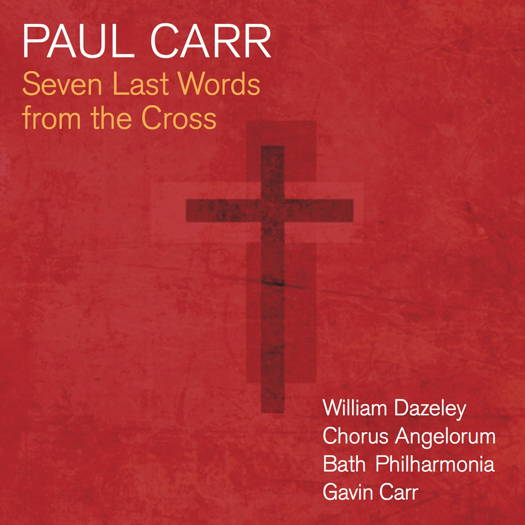
Paul Carr: Seven Last Words from the Cross. © Stone Records.
Catalogue number 5060192780376
I also have a fondness for my Oboe Concerto, dedicated to Nicholas Daniel, and recorded and performed several times by him. I think it's a good piece!
Listen — Paul Carr: Second movement (The Unusual Quietness of Snow /
Oboe Concerto) (0:35-1:33) :
I am also proud of my Stabat Mater which was commissioned last year by the English Arts Chorale and has been performed many times by them over the past year and also recorded. In fact, it was performed on 24 May 2019 in Oxfordshire at The English Music Festival.
When I was seventeen, I wrote a set of Dance Pieces for the legendary clarinettist, Dame Thea King. She wanted to broadcast them as part of her Radio 3 recital, but the BBC bizarrely refused. I can't imagine why? It was my first published piece and is still in print today.
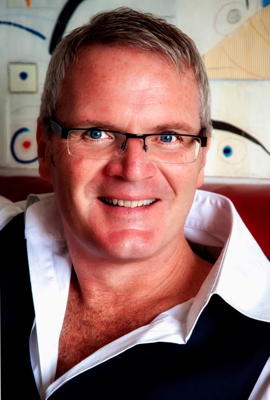
Paul Carr
AF: Would you like to say something about your music to listeners and readers?
PC: I would wish that people are either emotionally moved, or left feeling happy by my music. There is a serious side to some works that I hope will elicit an emotional response in those who perform and those who listen, the same way it did in me at the time of composition. Nothing makes me more happy than when people write to me or verbally express their emotional involvement in either performing or listening to a piece of mine. Of all the creative arts I feel that Music offers the greatest emotional impact on us as a whole; it has the greatest power to heal, to move, and to involve.
Copyright © 2 June 2019
Anett Fodor,
Hungary




